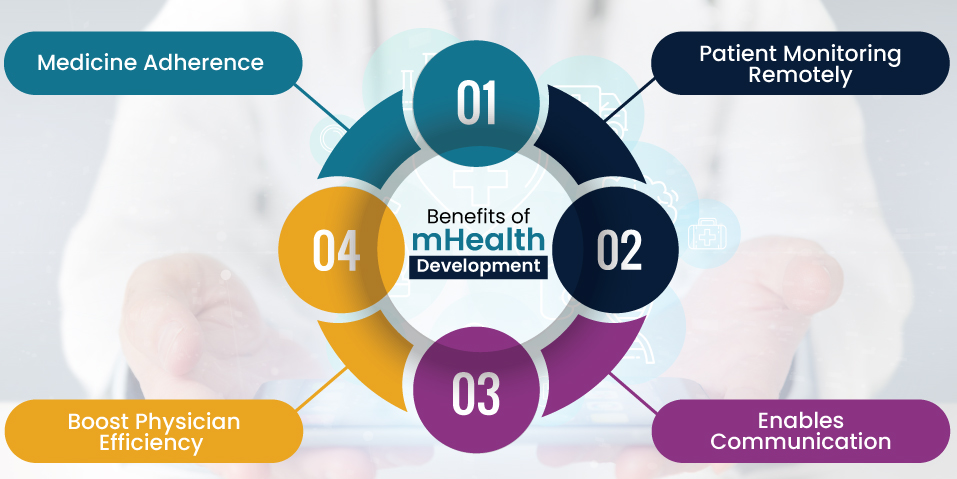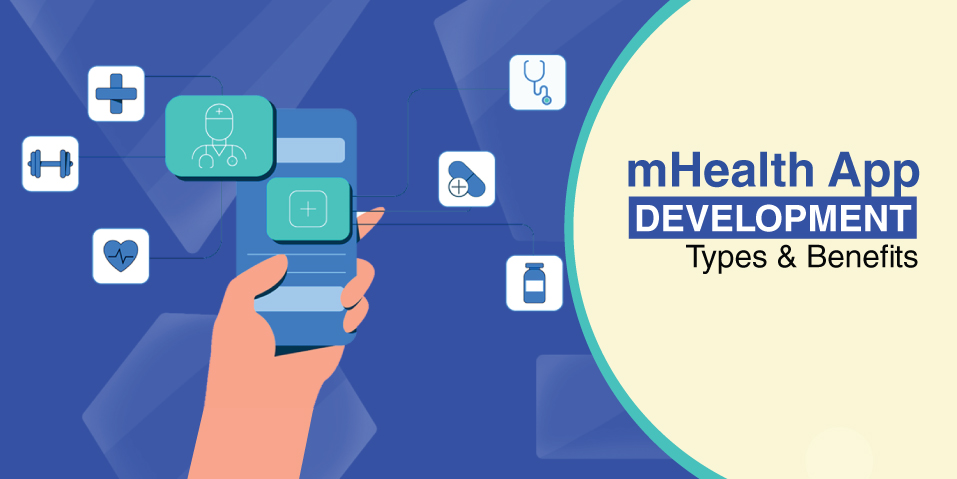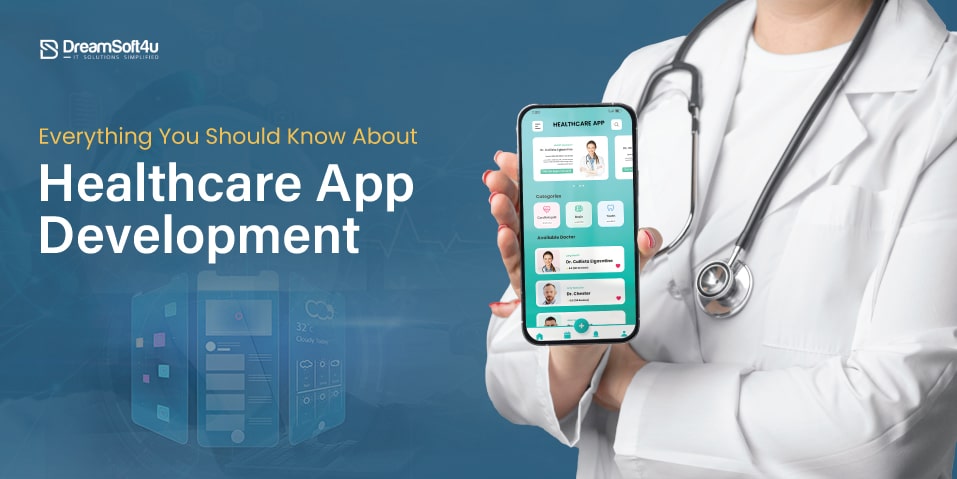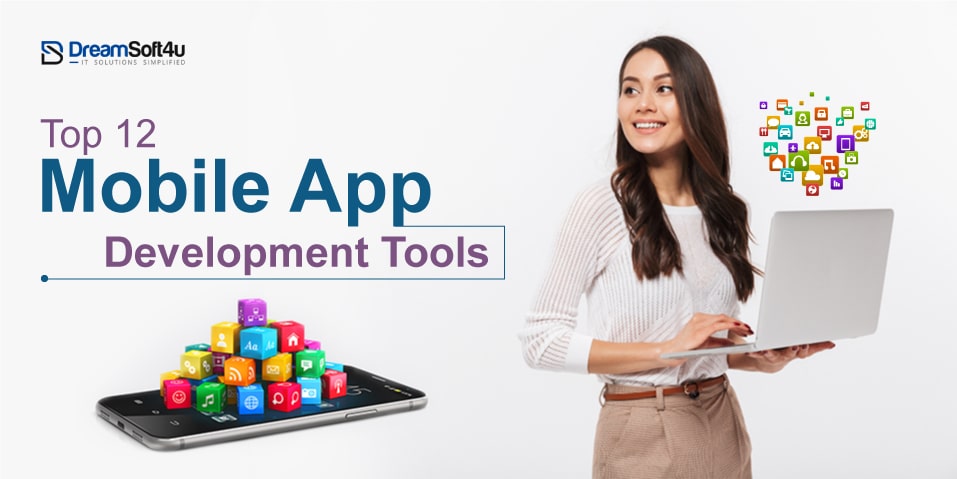The advent of technology and automation in the healthcare industry is catering to thriving business opportunities. One of the amazing scenarios of digitalization is mHealth App Development. Either you seek a prescription, medical cure, medication, etc. everything is possible today with the help of mobile phones, tablets, computers, and other handy electronic devices.
Not only this, a wearable device like a smartwatch has also got the facilities to tell you your health aspects. It can be your heart rate, total steps walked, blood pressure, etc. The article gives a detailed account of the utilization of mHealth App Development Solutions, Types, Benefits & Challenges. So, it becomes the need of the hour to get into these mechanics closely.
Table of Contents
ToggleWhat is mHealth App Development?
The section gives an understanding of mHealth Services and its related aspects. The definition explains this mechanism as “The process of delivering the best healthcare solutions via electronic gadgets like mobile phones, computer tablets, and through other electronic activity is welcomed in mHealth App Development.”
The mHealth stands for mobile health technology. It delivers the best treatment and healthcare aids via telecommunications and other multimedia technologies. The term was first released by Robert Istepanian.
This tool is framed to initiate electronic help to diagnostic centers, physicians, doctors, etc. for treatment. Furthermore, it facilitates advancement in disease-related study for physicians and people undergoing treatment.
mHealth services form an integral part of eHealth services. It helps in acquiring, transmitting, storing, processing, and securing the data to give exact health results. Thus, the main utility of mHealth Software is for doctors, physicians, somewhere to chemists, etc.
What are the mHealth Development Types?
The exercising of electronic gadgets in the healthcare industry has paved the way for better cures & treatments. There are different types of mHealth Assistance which have won over the traditional concepts.
As per the recent reports, mHealth Business is expected to touch $102.4 billion by 2022. The market is full of such mHealth Apps. Moreover, much more development is here to come in the future. So let’s get started by checking the mHealth Development Types:
- Remote Monitoring Apps
- Clinical & Diagnostic Apps
- Healthy Life Apps
- Clinical Reference Apps
- Productivity Apps
1. Remote Monitoring Apps:
The growing digital possibilities have made remote treatment possible to a huge extent. mHealth Software is one of the opportunities which allows the physician to treat patients from any corner of the world. The mHealth Apps brings in blood glucose levels, oxygen levels, heart rate, BP, etc. reports precisely.
You May Also Like:
2. Clinical & Diagnostic Apps:
These apps help doctors and physicians to accumulate data, analyze, and then share it. These applications help practitioners and physicians to view the lab results, check EHR and simultaneously perform the digital imaging. The best outcomes are checking the symptoms and the best possible diagnosis of the illness.
3. Healthy Life Apps:
This type of mhealth application is working well in building a robust health environment. These mHealth Apps utilize the metrics like heart rate, diet, workout plans, sleep, etc. By getting an account of the details, major diseases can be tracked.
4. Clinical Reference Apps:
The patients need to look here and there for getting good treatment references. These apps allow its users to get the latest information in their hands like E&M coding, ICD-g and ICD-10, and other respective documents.
5. Productivity Apps:
These apps are a tool for the physician, doctors, and healthcare providers for delivering good diagnosis and treatment. The apps offer mobile charting, remote healthcare facilities and are abide by HIPAA Compliance.
What Are the Benefits of mHealth Development?
The existence of mHealth App Development has led to many advantages in the healthcare industry. A few of them are discussed below. Read all the details carefully:
- Medicine Adherence
- Patient Monitoring Remotely
- Enables Communication
- Boost Physician Efficiency

1. Medicine Adherence:
The role of mHealth Facilities has extended to a large spectrum. Now mhealth care services are utilized to make patients remember about the medicines. There are automated medication reminders, pill information, pill refiling reminders, etc. The best concern of the app is to make patients adhere to the pills, avoiding bad medical conditions, and hospital readmissions.
You May Also Like:
2. Patient Monitoring Remotely:
In the widespread pandemic COVID-19, the best approach for patients is getting remote treatment. With mHealth Development, a patient can communicate by video conferencing, video calls, etc. A proper understanding of the disease, its cure, and then treatment is provided. Simultaneously, the data from wearable devices may help the physician to treat the patient accordingly.
3. Enables Communication:
mHealth Software allows patients and physicians to communicate from one end to another. The chats, messages, video calls, etc. are highly encrypted. The app is supported by HIPAA Compliance and hence keeps a secure eye on the data of the patient.
4. Boost Physician Efficiency:
The development of mHealth Apps has highly affected the working of healthcare providers. Simultaneously, it has demolished the burden of seeking patients face-to-face. Moreover, it has provided the ability to access a patient’s entire medical state with as few errors as possible.
So these were the amazing benefits of mHealth App Development. It is always asked to learn from failure. Hence, let us watch out for the drawbacks received with the mHealth Software.
What are the mHealth Development Challenges?
When talking about drawbacks, it becomes necessary to study the consequences of developing these eHealth Apps. As the phrase conveys, it is better to see both sides of the coin for future success. Hence, after getting the mHealth App Pros, now we will be discussing the mHealth App Cons. So let’s get started!
- Compliance Issue
- Availability of Multiple Device
- Security Infringement
You May Also Like:
1. Compliance Issue:
One of the prominent issues with mHealth Applications is its compliance with HIPAA or HITECH. Every region takes a notion of their healthcare regulations as per the requirements and prevailing conditions.
Countries like the USA follow HIPAA and PHI compliance when developing a mHealth Application. Along with this, If you are from the Canadian region, your mHealth app Development must follow PIPEDA guidelines. Thus, in this way, all-region have their own regulatory sets for healthcare services. Failure in following these guidelines may leverage huge penalties or police custody too.
2. Availability of Multiple Device:
With the blooming digitization in each sector, interoperability of the products continues to play hussle in the healthcare sector. Having numerous multimedia channels, electronic gadgets, etc. it becomes difficult to rely upon one device in terms of security and conversation.
3. Security Infringement:
This is the most common problem with developing a healthcare app. Security is what everybody keeps an eye on. Patient data, medical conditions, etc. are something that plays a vital role in any healthcare center. Many a time, it has been seen that the PHI and other secured data is compromised. So with the growing digital facilities, it has become so hard to keep data secure.
If you want a mhealth app development company? Connect with DreamSoft4u now!
Request A Free Quote
98+ Client Retention
To Sum Up
The best information on mHealth Development has been shared via this article. If you want to know more about the mHealth Development Cost, How to Make Money By mHealth Apps, etc. stay tuned to our website. mHealth has crossed all the set records and reaching towards framing new history. This will be the new trendsetter in the future with high business possibilities.
FAQs
Q1. How do I create a mHealth app?
Creating a mHealth app involves several key steps, including market research, defining scope and features, UX/UI design, app development, and testing and product launch.
Q2. What is an example of a popular mHealth app?
MyFitnessPal, which helps users track their daily food intake and exercise habits. Other popular mHealth apps include Headspace, which provides meditation and mindfulness exercises, and Medisafe, which helps users manage their medication schedule
Q3. What are some types of mHealth apps?
Fitness apps, nutrition apps, medication reminder apps, mental health apps, and medical reference apps are different categories of mHealth app development.
Q4. What are some key features of healthcare apps?
Some common features of healthcare apps include health tracking, data analysis, medication reminders, appointment scheduling, telemedicine capabilities, and secure messaging.
Q5. What are some benefits of mHealth app development?
mHealth apps come with numerous benefits, including faster engagement between patients and doctors, improved healthcare services, and cost-efficiency, leading to better patient care.
Q6. What are some challenges of mHealth app development?
Some challenges of mHealth app development include ensuring data privacy and security, achieving regulatory compliance, maintaining compatibility with various devices and platforms, and addressing user concerns about app reliability and effectiveness.











